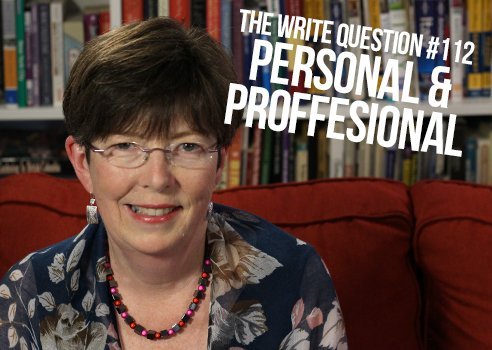Viewing time: 5 mins. 15 secs.
The Write Question is a weekly video podcast about writing that I started in 2017 and that ran, more or less weekly, until April 2022. This is a republication of issue #112, which gives advice on separating personal from professional writing. The post first ran on Oct. 18/19.
Transcript:
Do you know about separating personal from professional writing? That’s the topic I’m addressing today in The Write Question. I’m Daphne Gray-Grant, the Publication Coach.
Here’s a question from Olivia Campbell, a writer based in Surrey, BC. Here’s what she’s asked:
“If you write all day every day for work — emails, memos, reports — how can you get in a good mind frame for your own writing? I spend so much time on my computer that I sometimes don’t want to even turn on an electrical device again for my personal writing. But writing on paper and then transcribing it to a computer later seems like such a waste of time. Is it? Any tips? Also, if you suggest using a computer, is there any benefit to carting around two laptops when I’m travelling, so at least I can keep my work and personal work separate?”
Thanks for the question, Olivia. Some people reading the headline for this post might have assumed you were trying to reserve your energy for your professional work. But I can see you’re talking about how to ADD more writing to your day without having your professional work interfere too much.
I get it! I’ve written two books, and I did that in my “spare” time, while I was writing articles for other clients, coaching writers and doing plenty of corporate editing.
You’re wise to work to separate your professional writing duties from your personal ones. Here are my suggestions:
Consider the TIME when you’re doing your personal writing. I always tried to work on my books first thing in the morning. In my case, that’s 6 am and I would devote 30 minutes to it. I could never afford more time than that, but at least the books had the benefit of my first morning attention.
Some days, it was hard to do this writing, particularly when I knew I was facing another big deadline later that day, but I just closed my mind to the deadline and focused on the book. This is the Stephen Covey principle of doing what’s important before doing what’s urgent. See link to his book below.
Next, consider the PLACE where you’re doing your writing. I work from an office at the top of my house and when I’m at my desk, I don’t answer the door or the house phone and I don’t respond to personal email, either. I only do that type of stuff downstairs. I associate my office with work. Granted, I wrote my book from my office, but I think working at 6 am for just 30 minutes helped me keep those jobs separate.
Last, consider the DEVICE you’re using to write. I use my desktop computer for work and my laptop for personal stuff and for when I’m travelling. But I have one other device that you might find especially interesting. It’s called a Neo AlphaSmart.
Here’s what’s great about it: It’s really light. It weighs only two pounds and it’s virtually indestructible. I heard about it because two of my kids have learning disabilities and it was popular for kids with written output issues in school. Much less risky than a laptop. Also, it runs for 700 hours on three AA batteries. So, it’s great for camping!
But what I really liked about the device was that its screen is so small. You can see only six lines of type. As a result, it helped me break the habit of editing while I wrote. If you can’t see the words, you can’t edit them.
The bad news is that this device is no longer made. But I’ve heard from others that you can find them second-hand on places like E-bay. Looking for something like this is way smarter than writing by hand. Our brains work quickly and our hands write slowly. It’s hard for them to keep up with us. Plus, you have the nuisance of having to transcribe those words later. I’m linking below to a blog post on typing vs. handwriting. Be sure to watch the Clive Thompson video linked within. You’ll find it very instructive.
Those of us who do more than one type of writing need to take special steps to ensure we actually get the important personal writing done.
Finally, let me wrap up with a quote from the American cartoonist Bill Watterson, author of Calvin and Hobbes: “All this modern technology just makes people try to do everything at once.“
Olivia, it sounds as though you are strongly committed to pursuing your own personal writing projects. Consider using a special time, place and device to help cement that commitment.


